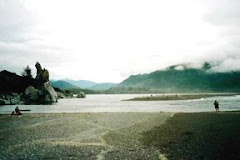First announced in February, it is now a certainty that the onset of water delivery to irrigators in the federal Klamath Project will be delayed.
Typically the irrigation season begins in the upper Klamath River Basin on April 1st. This year, however, the onset of irrigation had to be delayed in order to meet the Upper Klamath Lake water level required for endangered Kuptu and Tsuam (sucker species) and Klamath River flows required for threatened Coho Salmon pursuant to the federal Endangered Species Act.
If this were 2001 we would be hearing loud calls for protests, civil disobedience and “reform” of the ESA – back then the idea of fish having a water priority which trumps irrigation was anathema to the Klamath Water Users Association (KWUA) and its supporters.
So why are there no calls for protest now? Where is Ric Costales – initiator of the Klamath Bucket Brigade – when his organizing skills are apparently again needed to defend people from the ravages of the ESA?
KlamBlog thinks that KWUA is keeping the lid on cries, calls and protests because it knows that would make the possibility of the Water Deal it has negotiated with the Klamath Tribes, Karuk Tribe, Yurok Tribe, Trout Unlimited, American Rivers and a few other organizations even less likely to achieve the federal legislation needed to make the Deal - and its massive subsidies for Klamath Project irrigators - a reality.
As KlamBlog has pointed out previously (see, for example, our 1/18/08 post), the Water Deal – also known as the Klamath Basin Restoration Agreement or KBRA – favors those irrigators who receive water via the federal Klamath Project. Along with other subsidies, the KBRA would put those farmers first in line for water. Other farmers, fish managers and wildlife refuge managers would then have to buy water during drought years from these farmers or go without. That is one reason KlamBlog calls farmers within the Klamath Project the Irrigation Elite.
Putting the Irrigation Elite first in line for Klamath water can only be achieved via federal legislation. KWUA has apparently concluded that making a fuss about the ESA this year would hurt its chances of achieving that legislation. KlamBlog agrees. In the final analysis when principles do not “pencil out” they are quickly discarded in that circle.
But what would this drought year actually be like if the Water Deal were enshrined in legislation? Would the Fish & Wildlife Service have to pay the Irrigation Elite in order to achieve lake levels which Kuptu and Tsuam need to survive? Would the National Marine Fisheries Service be required to also buy water from the Irrigation Elite to meet Klamath River flows which most biologists tell us are essential to the survival of Coho Salmon? Would federal wildlife refuges managers have to go to the Irrigation Elite with hat (or money) in hand to provide for waterfowl and Bald Eagles? And how much would this cost taxpayers in a mildly doughty year?
Because it is turning out to be a “dry” – but not a “very dry” – year in the Klamath River Basin, this would be a good time to calculate what would happen during a mild drought if the Water Deal were enshrined in federal legislation. This would also be a good time to model what would have happened if this had turned out to be a severe drought year. How much money would the taxpayers have to pay the Irrigation Elite to keep Kuptu, Tsuam and Coho Salmon from extinction? How much would it cost the taxpayers to provide the water needed by waterfowl, Bald Eagles and the other wildlife on Klamath Basin refuges?
Don’t look for Water Deal’s promoters to perform this analysis. KlamBlog believes these boosters do not want the public and members of Congress to know the consequences if a select group of irrigators were legislatively granted the first-in-line water priority which they know – and the courts have affirmed - they can not achieve in any other way.
But perhaps we should not judge Water Deal promoters so harshly! Instead let’s call on them to put real analysis and hard data behind their public claims.
This then is a call and a challenge to the leaders of the Klamath Settlement Group - those who have dominated and lead negotiations resulting in the proposed Water Deal - to put up or shut up. Come now Trout Unlimited; it is time to stand up and put analysis behind your claims! Come on Yurok Tribe: are you up to the challenge? How about it KWUA? Why not show the public what would happen - and what it would cost - if the Deal you say is so good for fish, farms and refuges were in place this mildly doughty year?
And to those reporters, editors and media outlets covering Klamath issues: how about doing your duty by demanding that such an analysis be performed?
Deal makers all: KlamBlog and the public await your response!
Subscribe to:
Post Comments (Atom)


1 comment:
What if there was no Link River dam? The "natural" water levels in Upper Klamath lake (UKL)would be lower and the river flows less. The "opionions" requiring high lake levels for UKL are obviously bogus as are the high flows for coho.
Post a Comment